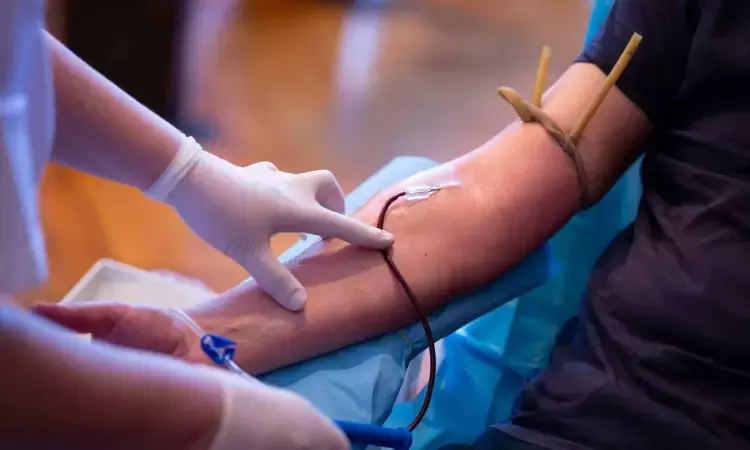- Home
- Medical news & Guidelines
- Anesthesiology
- Cardiology and CTVS
- Critical Care
- Dentistry
- Dermatology
- Diabetes and Endocrinology
- ENT
- Gastroenterology
- Medicine
- Nephrology
- Neurology
- Obstretics-Gynaecology
- Oncology
- Ophthalmology
- Orthopaedics
- Pediatrics-Neonatology
- Psychiatry
- Pulmonology
- Radiology
- Surgery
- Urology
- Laboratory Medicine
- Diet
- Nursing
- Paramedical
- Physiotherapy
- Health news
- Fact Check
- Bone Health Fact Check
- Brain Health Fact Check
- Cancer Related Fact Check
- Child Care Fact Check
- Dental and oral health fact check
- Diabetes and metabolic health fact check
- Diet and Nutrition Fact Check
- Eye and ENT Care Fact Check
- Fitness fact check
- Gut health fact check
- Heart health fact check
- Kidney health fact check
- Medical education fact check
- Men's health fact check
- Respiratory fact check
- Skin and hair care fact check
- Vaccine and Immunization fact check
- Women's health fact check
- AYUSH
- State News
- Andaman and Nicobar Islands
- Andhra Pradesh
- Arunachal Pradesh
- Assam
- Bihar
- Chandigarh
- Chattisgarh
- Dadra and Nagar Haveli
- Daman and Diu
- Delhi
- Goa
- Gujarat
- Haryana
- Himachal Pradesh
- Jammu & Kashmir
- Jharkhand
- Karnataka
- Kerala
- Ladakh
- Lakshadweep
- Madhya Pradesh
- Maharashtra
- Manipur
- Meghalaya
- Mizoram
- Nagaland
- Odisha
- Puducherry
- Punjab
- Rajasthan
- Sikkim
- Tamil Nadu
- Telangana
- Tripura
- Uttar Pradesh
- Uttrakhand
- West Bengal
- Medical Education
- Industry
FDA relaxes restrictions on blood donation by gay and bisexual individuals

The U.S. Food and Drug Administration has relaxed restrictions on blood donation by gay and bisexual individuals in new guidelines for blood donation organizations.
It has been recommended that donors be screened on the basis of one set of criteria, ending a restrictive policy that applied only to men who have sex with men and their female partners.
The US Food and Drug administration imposed a lifetime ban on donations from men who have sex with men, but its donation guidelines have been criticised for years. Taking a cue from the UK and Canada, now latest policy evaluates all prospective donors by the same set of criteria while screening for recent, higher-risk sexual activity.
The Biden administration had been seeking to end the previous set of time-based deferrals and screening questions for people who identified as men who have sex with men and their partners. Risk assessments now applies to all potential donors.
Individuals, other than those who report having a new sexual partner or multiple partners and had anal sex in the past three months, will be eligible to donate blood, provided all other eligibility criteria are met.
The new rules come several years after the U.S. health regulator reversed a 1980s guideline which banned men who have sex with men from donating blood, but with the caveat they had to abstain from sex for at least a year before donating.
The FDA had first proposed easing the sexual abstinence criteria for blood donation in January. The removal of time-based deferrals also applied to women who have sex with the men who have sex with other men.
The regulator also recommends new time limits for people taking pre-exposure prophylaxis or post-exposure prophylaxis treatments used for HIV prevention to reflect data showing these medications may delay the detection of HIV and result in false negatives.
The FDA said the rules aim to reduce the risk of transfusion-transmitted HIV and are similar to those in the UK and Canada.
Dr Kamal Kant Kohli-MBBS, DTCD- a chest specialist with more than 30 years of practice and a flair for writing clinical articles, Dr Kamal Kant Kohli joined Medical Dialogues as a Chief Editor of Medical News. Besides writing articles, as an editor, he proofreads and verifies all the medical content published on Medical Dialogues including those coming from journals, studies,medical conferences,guidelines etc. Email: drkohli@medicaldialogues.in. Contact no. 011-43720751


